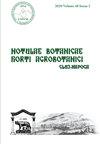The impact of cultivation system on nutritional quality of Jerusalem artichoke tubers cultivated in semiarid marginal areas
IF 1.3
4区 生物学
Q3 PLANT SCIENCES
引用次数: 0
Abstract
Jerusalem artichoke grows underground tubers that store fructans, primarily inulin, which are considered as prebiotics and functional dietary fibre with positive physiological benefits on human health. The aim of this study was to assess the yield and nutritional quality of Jerusalem artichoke tubers according to different cropping systems on dry sandy soils from Southern Romania. The experiments were carried out during 2018-2020 at the Research and Development Station for Plant Culture on Sands Dăbuleni, using a randomized complete block design with three replications. The experimental combined factors applied were fertilization with plants density (5×2). After the tubers were harvested, their quality was evaluated using standard methods. The results suggest that Jerusalem artichoke crop has minimal requirements for fertilization and tolerates very well high plants density without affecting significantly the yield and the nutritional features analysed, respectively the contents in total dry matter, soluble dry matter, inulin, soluble carbo-hydrates and C vitamin. A significant positive correlation was determined between the soluble dry matter and soluble carbohydrates content. The assessed biochemical compounds displayed high values in both fertilized and unfertilized conditions and in both densities, showing that Jerusalem artichoke is a perennial crop with multifunctional high growing potential in marginal terrains usually improper for the conventional crops.半干旱边缘地区栽培制度对菊芋块茎营养品质的影响
耶路撒冷朝鲜蓟生长地下块茎,储存果聚糖,主要是菊粉,被认为是益生元和功能性膳食纤维,对人体健康有积极的生理益处。本研究的目的是评估耶路撒冷洋蓟块茎在罗马尼亚南部干燥沙质土壤上不同种植制度的产量和营养品质。实验于2018-2020年在沙斛植物培养研究站进行,采用随机完全区组设计,共3个重复。试验施用的组合因子为施肥与密度(5×2)。块茎收获后,用标准方法评价其质量。结果表明,菊芋作物对肥料的需要量很小,对高密度的耐受性很好,对产量和总干物质、可溶性干物质、菊粉、可溶性碳水化合物和维生素C含量均无显著影响。可溶性干物质含量与可溶性碳水化合物含量呈极显著正相关。评价的生化化合物在施肥和不施肥条件下以及在两种密度下均显示出较高的值,表明菊芋是一种多年生作物,在常规作物不适宜的边缘地带具有较高的多功能生长潜力。
本文章由计算机程序翻译,如有差异,请以英文原文为准。
求助全文
约1分钟内获得全文
求助全文
来源期刊

Notulae Botanicae Horti Agrobotanici Cluj-napoca
PLANT SCIENCES-
CiteScore
2.70
自引率
0.00%
发文量
118
审稿时长
3 months
期刊介绍:
Notulae Botanicae Horti Agrobotanici Cluj-Napoca is a peer-reviewed biannual journal aimed at disseminating significant research and original papers, critical reviews and short reviews. The subjects refer on plant biodiversity, genetics and plant breeding, development of new methodologies that can be of interest to a wide audience of plant scientists in all areas of plant biology, agriculture, horticulture and forestry. The journal encourages authors to frame their research questions and discuss their results in terms of the major questions of plant sciences, thereby maximizing the impact and value of their research, and thus in favor of spreading their studies outcome. The papers must be of potential interest to a significant number of scientists and, if specific to a local situation, must be relevant to a wide body of knowledge in life sciences. Articles should make a significant contribution to the advancement of knowledge or toward a better understanding of existing biological and agricultural concepts. An international Editorial Board advises the journal. The total content of the journal may be used for educational, non-profit purposes without regard to copyright. The distribution of the material is encouraged with the condition that the authors and the source (Notulae Botanicae Horti Agrobotanici Cluj-Napoca or JCR abbrev. title Not Bot Horti Agrobo) are mentioned.
 求助内容:
求助内容: 应助结果提醒方式:
应助结果提醒方式:


